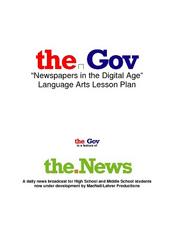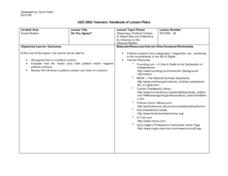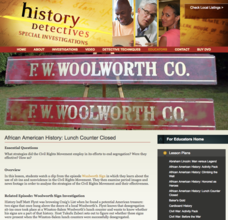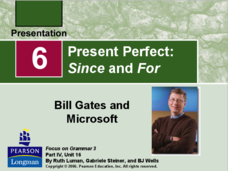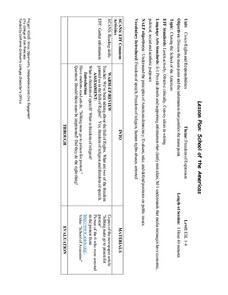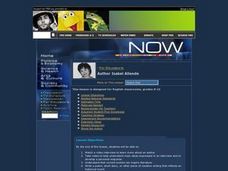Curated OER
Newspapers in the Digital Age
Is journalism more or less reliable with the influx of Internet sources? Learners investigate the issues of freedom of speech, journalistic ethics, and social responsibility in the age of Twitter and Facebook. After examining the...
Constitutional Rights Foundation
How the First State Constitutions Helped Build the U.S. Constitution
Did you know that the United States Constitution was adopted after many state constitutions were already in place? Young scholars examine facts about the influence of states through an informative and interesting resource. Groups then...
Curated OER
Student Opinion: How Should Schools Address Bullying?
Spark a disscussion about a current issue, bullying, in your classroom. This resource, published by The New York Times, provides a short article discussing a Anti-Bullying Bill of Rights passed into law in the state New Jersey followed...
Curated OER
Do You Agree?
Students recognize bias in a political cartoon, evaluate how the media uses both positive and/or negative political cartoons, and assess the influence a political cartoon can have on a person.
Curated OER
We Are the Government
Students read primary documents to find the motivations of the founding fathers of the United States. In this primary documents lesson, students discuss the meaning of the Preamble to the Constitution, read parts of the Constitution...
Curated OER
American Government Worksheet 1
In this American government worksheet, learners respond to 12 true/false, 11 alphabetical order, 15 fill in the appropriate articles, 15 matching, and 1 cryptogram about the structure of the American government.
PBS
African American History: Lunch Counter Closed
Young historians investigate and evaluate the effectiveness of the strategies the Civil Rights Movement used to end segregation in the United States. After watching an video interview with Carl Matthews and Bill Stevens who participated...
Shmoop
ELA.CCSS.ELA-Literacy.RI.11-12.3
Make analyzing the sequence of events in an informational text easy. Ask readers to craft a one-sentence summary of each paragraph in a document and create a text map. To demonstrate their understanding of the process, participants read...
K12 Reader
Responsibilities of Citizenship
Your pupils are all citizens of your classroom. Provide some more instruction on how people can be citizens with the reading passage included here. After reading, learners answer the five related questions.
Pearson
Present Perfect: Since and For
Present perfect tense doesn't mean that something is perfect, just that it's continuing from the past into the present. Demonstrate proper usage of present perfect verb tense with a slideshow presentation, which features a passage about...
Constitutional Rights Foundation
The Election of 1912
The Election of 1912: an election with four competitive opponents. Pupils get to know the candidates with informative reading passages that provide context to the election. Then, the class engages in a debate and answers questions as one...
EngageNY
Grade 9 ELA Module 4, Unit 1, Lesson 17
How did the Demerara Rebellion of 1823, the death of Reverend John Smith, and the Emancipation Bill of 1833 that abolished slavery throughout the British Empire change the sugar industry? Class members examine how the authors of Sugar...
Curated OER
A Gesture Is Worth a Thousand Words
Students share observations on the nuances of meaning in face to face and online interactions with others. After reading an article, they identify the causes and effects of internet flaming. They create their own comic strips...
Curated OER
School Of The Americas
High schoolers investigate the concept of The Bill Of Rights in order to review the freedom of speech and religion. They read an article in order to establish a context. The lesson continues as students research some cases of free speech...
Albert Shanker Institute
Economic Causes of the March on Washington
Money can't buy happiness, but it can put food on the table and pay the bills. The first of a five-lesson unit teaches pupils about the unemployment rate in 1963 and its relationship with the March on Washington. They learn how to create...
National Constitution Center
Born in the U.S.A: Music as Political Protest
Though often used in shows of patriotism, Bruce Springsteen's 1985 song "Born in the U.S.A." is critical of America's role in the Vietnam war and its treatment of American veterans. High schoolers analyze the song's lyrics in an activity...
Teaching Tolerance
Understanding the Prison Label
Break the chain. An engaging lesson examines why it is so hard to break free of the prison system in the US. Academics participate in a reader's theater, read primary sources, and discuss their thoughts. The lesson explains the hardships...
Teaching Tolerance
Parallels Between Mass Incarceration and Jim Crow
Is history repeating itself? A riveting lesson examines the parallels between mass incarceration in the U.S. and the Jim Crow Laws of the past. Academics review Jim Crow Laws and compare them to mass incarcerations of African Americans....
Constitutional Rights Foundation
Puritan Massachusetts: Theocracy or Democracy?
Was Puritan society governed as more of a theocracy or democracy? After comparing and contrasting a series of primary source documents, middle and high schoolers form small groups and debate the question.
Newseum
Free Press Challenges Through History: Analyzing Historical Sources
The debate over the integrity of stories in media is not new. Young journalists analyze historical sources that reveal freedom of the press controversies and draw parallels to challenges freedom of the press faces today.
Curated OER
Brown Bear, Brown Bear
Students complete a variety of activities related to the book "Brown Bear, Brown Bear." They role-play the animals from the story, read about the book's author Bill Martin, Jr. on his website, discuss the rhythm of the story, and create...
Curated OER
Literature: Isabel Allende
Young scholars watch and respond to a Bill Moyers Now video on the Chilean author, Isabel Allende. They brainstorm a list of recent events that might inspire writers and choose one to write about in poetic, diary, or short story form.
Roy Rosenzweig Center for History and New Media
Founding Documents
Teach the class about the predecessor to Declaration of Independence—the Virginia Declaration of Rights. Using the foundational documents, scholars examine the two writings to consider how they are similar and how they are different. A...
Curated OER
Structure and Support
Eighth graders read copies of The Declaration of Independence, United States constitution, and the Bill of Rights. They write an opinion about the document they feel is most important in the history of the united states. This is their...
Other popular searches
- English Bill of Rights
- The Bill of Rights
- Classroom Bill of Rights
- Constitution Bill of Rights
- Bill of Rights Play
- Bill of Rights Lesson
- Bill of Rights Day
- U.s. Bill of Rights
- Bill of Rights Newsletter
- Bill of Rights Debate
- British Bill of Rights
- American Bill of Rights


